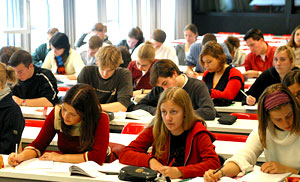De ondraaglijke lichtheid van hoger onderwijs

Met de uitkomst kan iedere docent zijn voordeel doen, zoschrijft Tim-Patrick Limmer (UvA-student).
Does university teach for mediocrity? In their recent Ph.D.-thesis
Van Rossum and Hamer conducted research to investigate how eachof these stages is represented in Dutch higher education findingthat 75 % of their sample understands learning as a means forsimple reproduction of knowledge. The education system itselfleaves little room for students to develop a deeper understandingreaching for stages 4 till 6. Even more, some research givesevidence that “students may become less likely to employ a deepapproach” starting their tertiary study after high school.
Instead of teaching for excellence, higher education teaches formediocrity. Especially on bachelor level, students are beingassessed superficially with standardized multiple choice tests. Theteaching style itself is mostly didactic with the teacher standingin front of 100-200 students and flipping throughPowerPoint-slides. Since no deeper understanding is required topass courses, students do not even have to read in depth thematerial that is given out by the professor.
6-Stage Model
So what do these stages entail? On stage 1, learning isunderstood as the mere transmission of knowledge. Teachers teachwithout interacting with students who then simply memorizeinformation ‘sentence by sentence’. Learning on stage 2 involvesthe first quantitative reflection of the knowledge taught. Studentsmemorize specific parts that are considered important forexaminations later on and have certain possibilities to askclarifying questions during classes. Like the first two stages,stage 3 also only involves reproductive learning. Here, studentsreflect even further what knowledge might be useful for practicalapplications later on in their life.
Most university education is based on those first three stages.Higher education, however, should entail more than superficiallymemorizing information. Van Rossum and Hamer see a watershedbetween stage 3 and 4 where students shift their concept oflearning from reproducing knowledge to constructing meaning. Instage 4, students develop the capability to think within ascientific theory and gain a critical awareness of itsassumptions.
But only at stage 5, students start to expand their thinkingbeyond disciplinary borders and apply their knowledge to givemeaning to their reality. This involves teachers functioningpredominantly as guides who are specialists in their respectivefields. The topic is explored in group discussions where professorand student represent equal partners. Such teaching techniques losetheir relevance once teaching proceeds to stage 6. Van Rossum andHamer state that here the focus shifts from ‘learning-to-know’ to’learning-to-be’. Students develop an increased self-awareness andsee learning as key element of answering the question ‘Who am I?’In order to achieve this stage, professors have to truly find their’inner voice’ and create an atmosphere of mutual trust and sharingin their class.
Teaching for Mediocrity
This mindset of “just studying what is necessary” contributes toanother phenomenon widespread in Dutch universities: the’zesjescultuur’. In an environment where you are not challenged tolearn in a deeper fashion you may also lack the ambition to do muchfor your studies in the first place. Dutch universities haveresponded to this trend by implementing more study components suchas Honours programs. Students that reach a certain average are ableto take additional courses resulting in an extra qualification foryour degree. However, what course designers should keep in mind isthat reaching excellence does not mean to simply teach more.Instead, it is about the way students are taught and theenvironment that is created to create true learning.
Tim-Patrick Limmer studies Economics at the University ofAmsterdam and worked as an editorial intern forScienceGuide.
Meest Gelezen
Wederom intimidatie van journalisten door universiteit, nu in Delft
‘Burgerschapsonderwijs moet ook verplicht worden in hbo en wo’
Extra geld voor bètafaculteiten is daar nooit terechtgekomen
Raad van State: laat taaltoets nog niet gelden voor hbo-opleidingen
Vrouwen houden universiteit draaiende, maar krijgen daarvoor geen waardering



